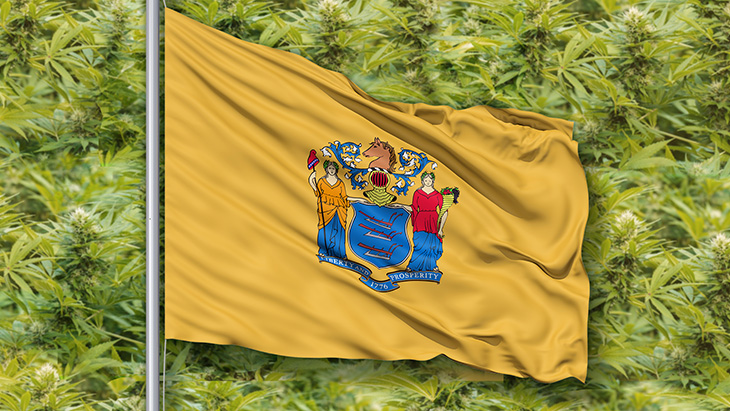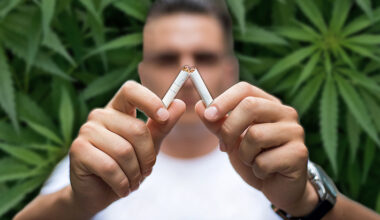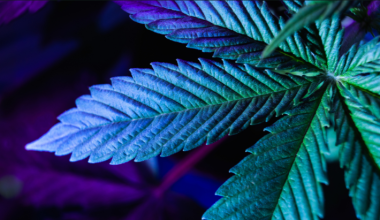The following blog post was drafted by longtime NORML activist Chris Goldstein.
It took a decade of legislative politics and nearly three million voters changing the New Jersey state constitution to end cannabis prohibition in the Garden State.
Governor Phil Murphy signed a suite of laws on Feb. 22, 2021 legalizing marijuana for adult-use and creating provisions for a regulated cannabis marketplace. One year later, stakeholders measured the progress.
In a statement released to NORML, Democratic Gov. Phil Murphy expressed pride in the achievement.
“The main goals of our administration’s cannabis reform efforts have always been to promote social justice and reverse decades of disparate treatment of minority and low-income New Jerseyans because of the failed War on Drugs,” Murphy said.
Though the adult-use market won’t be a reality for several more months, the change in the law had a more immediate and dramatic impact: It brought an end to mass arrests of cannabis consumers.
“I am immensely proud that decriminalizing cannabis has led to a reduction of unnecessary arrests among communities of color. Social justice will continue to guide our ongoing efforts toward the establishment of New Jersey’s adult-use recreational cannabis market,” said Gov. Murphy.
The New Jersey Cannabis Regulatory Commission (NJCRC) has been working diligently to iron out the complexities of selling and taxing cannabis while trying to maintain a spirit of equity.
Applications for micro-level small business permits will open on March 15. No date has been set yet for sales to begin.
The effects of reform for New Jersey cannabis consumers has been more tangible, resulting in a profound shift in how police interact with the community. And that was the result of hard-earned language in the decriminalization law.
Communities in New Jersey are remarkably diverse. Carefully collected statistics detail how police unevenly targeted Black and Hispanic residents — especially young adults — for cannabis arrests
“These arrests had a devastating, and often lifetime effect, on the poor in New Jersey who bore the brunt of disproportionate enforcement,” said Ken Wolski, a lifetime member of NORML and co-founder of the Coalition for Medical Marijuana New Jersey (CMMNJ).
Legislators in Trenton had attempted for years to pass a single, all-encompassing cannabis bill, even before Murphy came to office in 2017. While money was the center of debates, prohibition enforcement continued.
More than 100 people were being arrested for marijuana possession every day and then dragged through courts.
“Prohibition created second class citizens who were living in Ground Zero of the War on Drugs,” said Wolski. “Thousands of people every year were deprived of opportunities for employment, education, housing and even a stable family life.”
The November 2020 ballot referendum resulted in a landslide at the polls. But, the actual language was extremely narrow, it only mandated retail sales. There was nothing about criminal justice reform.
The legislature had to follow up with all the details. It took months of grueling hearings during the height of pandemic lockdowns. Politicians and advocates adapted to presenting virtually.
After the referendum, legislators landed on two key bills for the solution. One dealt with sales and taxes, the other untied the many knots that maintained criminal enforcement. There was also a third “cleanup” bill marrying the policies. Without the decriminalization law, arrests for non-regulated cannabis might have continued unabated.
There were bitter debates among politicians on these issues, especially regarding fines for anyone under 18. But there were also standout moments. State Senators Teresa Ruiz and Troy Singleton batted back several attempts to dilute the bill. They stood firm to assure that juvenile arrests didn’t become the focus for police after legalization.
Ultimately, what was signed by Gov. Murphy is one of the more progressive and well-thought out decriminalization policies in the country. It not only stopped arrests, it also limits interactions over cannabis between police and residents of all ages.
Senator Singleton said there is a bigger picture too, “Decriminalization is just a small piece of a broader and more comprehensive effort that is needed to help address the public health crisis that is addiction.”
He told NORML that newly freed up resources will expand treatment services for substance use and mental health disorders, along with other community services.
“The work we have done to reduce incarcerations for simple drug offenses and focus more so on providing treatment will save lives and make better economic sense for public coffers,” said Singleton.
The ACLU-NJ is a key partner in cannabis reform. They spent years presenting data that clearly illustrated a pattern of institutional racism within prohibition enforcement.
“This disparity was a key reason why cannabis law reform was so urgently needed,” said ACLU-NJ Policy Counsel Joe Johnson.
On the sticking point of penalties, advocates and legislators in New Jersey felt they were inadequately addressed by laws around the country thus far. That inspired some real innovation.
“It was also essential to enact policies that don’t criminalize youth for possession,” said Johnson, “We’ve learned from other states that have legalized cannabis that, without these policies, arrests simply shift to youth, perpetuating the unnecessary criminalization of youth of color for simple cannabis possession.”
Last year, immediately after the laws were signed, N.J. Attorney General Gurbir Grewal issued explicit instructions to every police department about the new policies. They can be found here: https://www.njoag.gov/marijuana/
Six ounces is the decrim possession amount for dried flower. Fines will be issued with no criminal record for any violation. The odor of cannabis is no longer grounds for any search. Special rules are in place to protect young adults and juveniles during any police encounter over cannabis. Non-regulated marijuana can still be confiscated.
Police unions are still complaining about aspects of the new procedures. Namely, that they’re unable to arrest teens for having a small amount of weed.
Today, none of the imagined negative impacts predicted by law enforcement about ending prohibition have materialized.
And while possession arrests have stopped — which were more than 90 percent of cannabis violations — there are still ways to get into trouble with the cops
New Jersey infamously left home cultivation out of both the adult-use and decriminalization laws. Penalties for even a small plot of cannabis remain harsh in the Garden State. And possessing a few plants remains illegal even for for registered medical patients.
Adam Umansky sits on the board of Sativa Cross, a non-profit that works on medical cannabis and wheelchair accessibility. He lamented that most patients felt shuffled aside by Trenton in the gold-fever atmosphere of adult-use.
“Despite all the promises coming out of Trenton, patients are still waiting for equitable and affordable access,” said Umansky.
Some large medical permit holders support home grow, others have lobbied against it. Governor Murphy is open to the concept, and two bills are active in Trenton.
Umansky said that personal cannabis cultivation, especially for medical use, was the most salient issue for NJ politicians to consider at the one-year mark.
Jo Anne Zito is on the Board of Directors at CMMNJ, where she’s helping lead the personal cultivation campaign. On the front lines, she felt that any opposition was from just a few politically connected companies.
“Although simple possession arrests disenfranchised me, the laws prohibiting personal cannabis home cultivation, that are still on the books, are what really devastated me and my family,” said Zito, “So, while I’m thankful for this amelioration over the past year, I feel there’s more to be done to protect people.”
Zito is urging legislators to allow patients to immediately sprout a few seeds.
“Post-legalization, any punishments for cultivating a few cannabis plants are excessive, especially for a registered patient. This needs a correction,” said Zito.
Possession arrests were happening right up until the laws were signed. Still, New Jersey’s cannabis consumers have started to enjoy the first respites over the last year; a long tragedy concluded.
“We do know that more than 360,000 marijuana convictions have been expunged since legalization,” said the ACLUNJ’s Johnson, “That’s a tangible step toward greater racial and social justice.”
Related
Medical Disclaimer:
The information provided in these blog posts is intended for general informational and educational purposes only. It is not a substitute for professional medical advice, diagnosis, or treatment. Always seek the advice of your physician or other qualified healthcare provider with any questions you may have regarding a medical condition. The use of any information provided in these blog posts is solely at your own risk. The authors and the website do not recommend or endorse any specific products, treatments, or procedures mentioned. Reliance on any information in these blog posts is solely at your own discretion.






